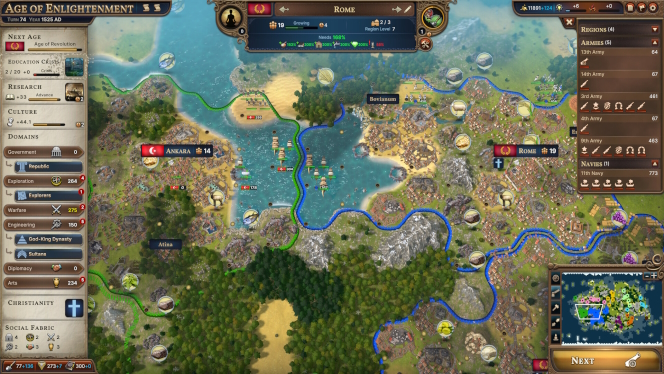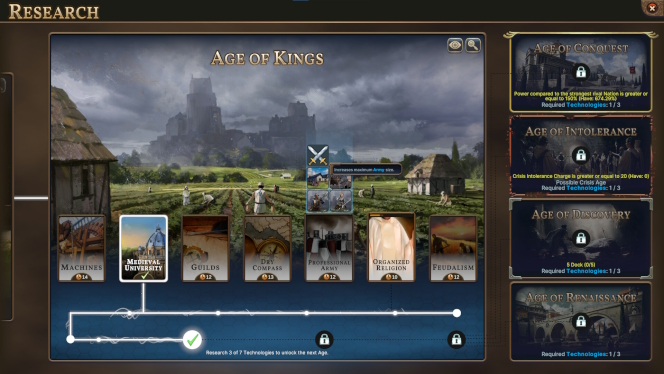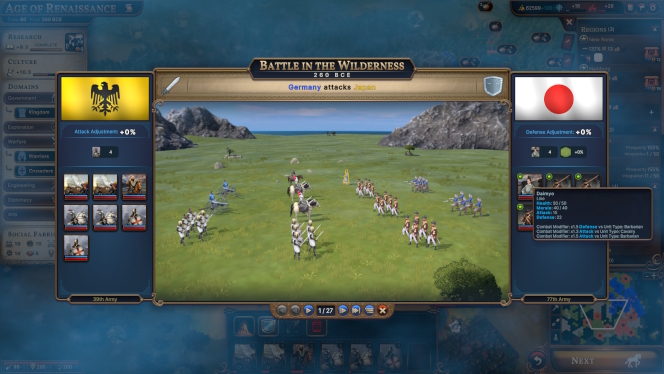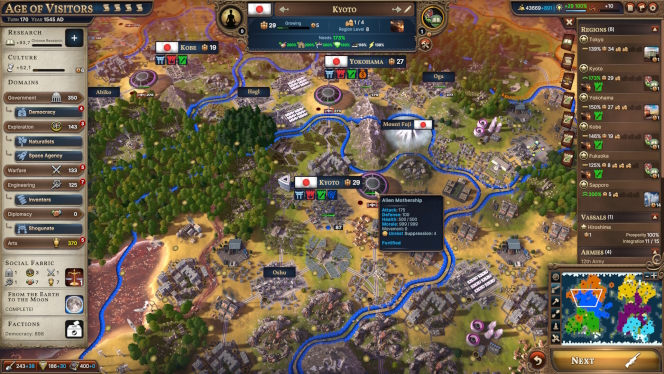REVIEW – It’s been eight years since the last Civilization was released, and although there have been promising attempts to renew the 4X genre since then, few have really left a lasting impression on the table. Is Millennia, the latest game from C Prompt Games, published by the legendary Paradox Interactive, just one in a long line of epigones, or can it offer something new in the popular genre?
I’m not giving away much news when I say that the genre of 4X “grand strategy” empire-building, turn-based games has been dominated for decades by Sid Meier’s Civilization series. The last episode, Civ VI, arrived in 2016. CivilizationVII, if everything is true, is expected this year. However, during the long wait, some up-and-coming titles appeared, which tried to expand the boundaries of the genre a little. To mention, there were only two games that turned out to be a delightful surprise for me: Humankind and Old World. Although they did not revolutionize the genre, they tried to refine it, and both added some exceptional features. In the following, we will try to find out whether Paradox’s latest title, Millennia, was capable of the same feat the aforementioned programs achieved.
Millennia’s developers, C Prompt Games, don’t seem to have much experience in strategy games. However, if we take a closer look at the roster, it soon becomes clear that the team includes some of the creators of Age of Empires 2 and Age of Mythology, as well as former Blizzard developers. All of this can be seen in the game, which can be accused of many things but indeed not of amateurism. At every moment, you can feel the time and energy invested, as well as the enthusiasm of the makers. Let’s see what their dedication was enough for!
Ages and Domains
If we can say something about Millennia immediately, it is the reasonably free handling of historical eras (Ages). The game innovatively approaches the theme, since the development is not entirely linear. We also have the opportunity to choose different alternative historical paths that can take the history of humanity in directions utterly different from reality. The “Ages” follow each other in a kind of hierarchical order, allowing you to choose. In addition, the game does not force us to reach the highest levels of technological development. If we manage to achieve our chosen victory conditions earlier, at any level, we have the option of selecting a “Victory Age” that leads to the end of the given campaign. This system is a real innovation compared to previous titles in the genre and significantly increases variation and replayability.
Nation-building is similarly complex. Although there are relatively few options in the Nation Builder basic menu in the first round (and they are mainly visual, e.g. how our cities should look, etc.), options such as the unique “National Spirit” and system of selectable buffs and unique technologies (Domains, Domain Powers) offers many development opportunities. Some Domains focus on combat (for example, they make new unit types available and increase the chance of success in battles), others on the economy, or even on the development of science and technology. Most of the different Domains and Tech Trees can be mixed and varied, lending a truly unique flavor to our empire being built.
Regions and economy
Millennia’s territory system is somewhat different from other games in the genre. Although the cities are also important here, the individual tiles are assembled into Regions and then into quite complex economic zones, where the city, smaller villages and various raw material producing and processing places and plants play an essential role. The game places particular emphasis on the economy: it provides many different tools for the extraction and use of raw materials, which can then take the development of our budding civilization in a completely different direction. To stick with a straightforward, early example: if we occupy a forest, we can use the harvested wood for construction, strengthening our economic potential. But if we instead choose to make paper, then scientific development and our diplomatic possibilities expand. We find many similar opportunities since the game offers a vast number of developments, technologies, and building and unit types.
At the same time, we don’t have to delve entirely into the mysteries of micromanagement. With our diplomatic tools – as well as choosing the right Domains – we can create a real army of vassals. In managing vassal states, it is far from necessary to intervene as profoundly as in our own regions. However, they are significantly more helpful than in most 4X games, providing real advantages to players who prefer the experience of combat and conquest.
There is also a combat system (but why…)
Unfortunately, by far the weakest element of the game, not only because of the technological implementation, but also because of the concept, is the combat system. Although there is an enormous amount of units to develop and manufacture, the introduction of various unit types and “combat modifiers” simplifies the combat system to the level of wood wedges. Ultimately, we will still use our most advanced weapons, which are equally effective against anything and everyone. Of course, it’s hard to balance a combat system where the rocket launcher goes against the wooden stick.
What finally presses the cold kiss of death on the combat system is the graphic presentation. I don’t know if it was intended as a deliberate homage to, say, Civilization: Call to Power or if it just happened that way, but the appearance and gameplay of the clashes are roughly reminiscent of the technical level of the early 2000s. So, in this form, it only made sense that we could see live the capabilities of our units, their statistics and their effectiveness against the enemy’s specific formations. It should be appreciated that the developers tried to (sort of) model all units, but the vast majority of players will probably skip the monotonous and ugly battles…
Graphics and performance
Let’s start with the good news: Millennia runs very stable, and you don’t encounter any (significant) bugs, which is a welcome novelty for Paradox releases. (Yes, I was thinking of you, Cities Skylines 2!) It’s true that good performance requires more robust hardware, so the game’s stated hardware requirements should be taken seriously. At the same time, the program is somehow not really beautiful. The map is attractive, the appearance of the settlements is varied, and their development is spectacular. However, the landscape quickly becomes crowded with too many buildings, which is further worsened by the proliferation of inappropriately sized labels and icons, as well as the cumbersome UI design. As for the effects and the combat system presented above, the game can almost be considered an actual “time travel”: back to the era of Civilization V.
Despite all its complexity, Millennia can be pretty basic at times. Essential features, such as speeding up game time, are missing. The diplomacy menu offers few options and is disappointingly simple – especially with the slightly overcomplicated development screens and Tech Trees. The AI isn’t particularly stupid, but you shouldn’t expect miracles from it either. Especially in terms of moving formations and combat situations, it sometimes encounters serious difficulties.
Millennia: no revolution, but a fine game
Despite all my critical comments, I would like to emphasize that Millennia is a pleasant, good game. Complex, substantial, (more or less) balanced 4X TBS, which, if it did not revolutionize the genre, brought some exciting and important innovations. Nation-building, regions, and economy mechanics all present elements that would compliment a Civ title. Where the game bleeds, however, is the combat system and – especially – the implementation. The best of times mediocre graphics, uncharacteristic sound effects and music detract significantly from the value of the otherwise exceptionally enjoyable game. Even with all of this, I can recommend Millennia to genre fans, especially now that the publisher wisely offers it a little cheaper than the AAA titles…
-ROD-
Pro:
+ Ingenious new mechanics
+ Complex region and economy management
+ Good performance
Cons:
– Some minor imbalances
– Terrible combat system
– Disappointing, outdated visuals
Publisher: Paradox Interactive
Developer: C Prompt Games
Style: TBS/Grand strategy
Release date: 24 March 2024
Millennia
Gameplay - 7.5
Graphics - 6
Story - 7.8
Music/Audio - 6.5
Ambience - 7.8
7.1
GOOD
For all its faults, Millennia is a pleasant, good game. It's a complex, substantial, (more or less) balanced 4X TBS that, if it didn't revolutionise the genre, did bring some interesting and important innovations. Where the program still bleeds is in the combat system and, especially, in the implementation and visuals.



















